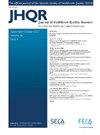一项评估由麻醉师报告的危急事件的意识和实践的调查结果
IF 1
Q4 HEALTH CARE SCIENCES & SERVICES
引用次数: 0
摘要
背景和目的增强麻醉患者安全在很大程度上依赖于关键事件的报告和分析。我们做了一个基于网络的在线调查,旨在评估我们的麻醉师对印度重大事件报告的认识和实践。材料和方法通过在线社交媒体平台分发一份经过验证的问卷,以评估麻醉师对事件报告和分析的认识和当前做法。及时发出提醒以提高回应率,并在收到足够回应后分析数据。结果在收到的506份回复中,60%的受访者表示拥有工作场所事件报告系统。尽管有很高的意识,但绝大多数人表示不愿报告这些事件,理由是害怕受到指责和羞辱。最常见的报告事件包括心脏骤停和药物错误。确定的促成因素包括人员配备不足、沟通差距、工作时间延长、工作环境紧张以及缺乏机构协议。尽管我们的麻醉师对危急事件报告的认识程度很高,但与指责和指责有关的担忧阻碍了报告过程。由于缺乏统一的报告制度,制定全国性的指导方针,建立规范的报告制度是当务之急。本文章由计算机程序翻译,如有差异,请以英文原文为准。
Results of a survey to evaluate awareness and practices of critical incident reported by anaesthesiologists
Background and objectives
Enhancing patient safety in Anaesthesia relies significantly on critical incident reporting and analysis. We did an online web-based survey aiming to evaluate the awareness and practices of our anaesthesiologists on critical incident reporting in India.
Materials and methods
A validated questionnaire was disseminated via online social media platforms to evaluate the awareness and current practices of anaesthesiologists on incident reporting and analysis. Timely reminders were issued to enhance response rates, and data analyzed upon receipt of sufficient responses.
Results
Among the 506 responses received, 60% reported having a workplace incident reporting system. Despite high awareness, a significant majority expressed reluctance to report incidents, citing the fear of blame and shame as a deterrent. The most frequently reported incidents included cardiac arrest and drug errors. Identified contributing factors included inadequate staffing, communication gaps, prolonged work hours, a stressful work environment, and the absence of institutional protocols.
Conclusions
Despite a notable level of awareness regarding critical incident reporting among our anaesthesiologists, apprehensions related to blame and finger-pointing hinder the reporting process. As a uniform reporting system is lacking, formulating a national guideline, and establishing a standard reporting system is the need of the hour.
求助全文
通过发布文献求助,成功后即可免费获取论文全文。
去求助
来源期刊

Journal of Healthcare Quality Research
Medicine-Health Policy
CiteScore
1.70
自引率
8.30%
发文量
83
审稿时长
57 days
期刊介绍:
Revista de Calidad Asistencial (Quality Healthcare) (RCA) is the official Journal of the Spanish Society of Quality Healthcare (Sociedad Española de Calidad Asistencial) (SECA) and is a tool for the dissemination of knowledge and reflection for the quality management of health services in Primary Care, as well as in Hospitals. It publishes articles associated with any aspect of research in the field of public health and health administration, including health education, epidemiology, medical statistics, health information, health economics, quality management, and health policies. The Journal publishes 6 issues, exclusively in electronic format. The Journal publishes, in Spanish, Original works, Special and Review Articles, as well as other sections. Articles are subjected to a rigorous, double blind, review process (peer review)
 求助内容:
求助内容: 应助结果提醒方式:
应助结果提醒方式:


